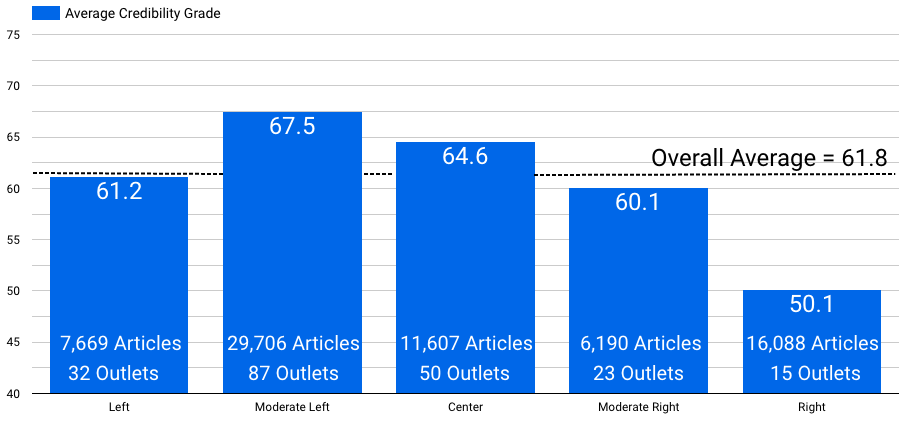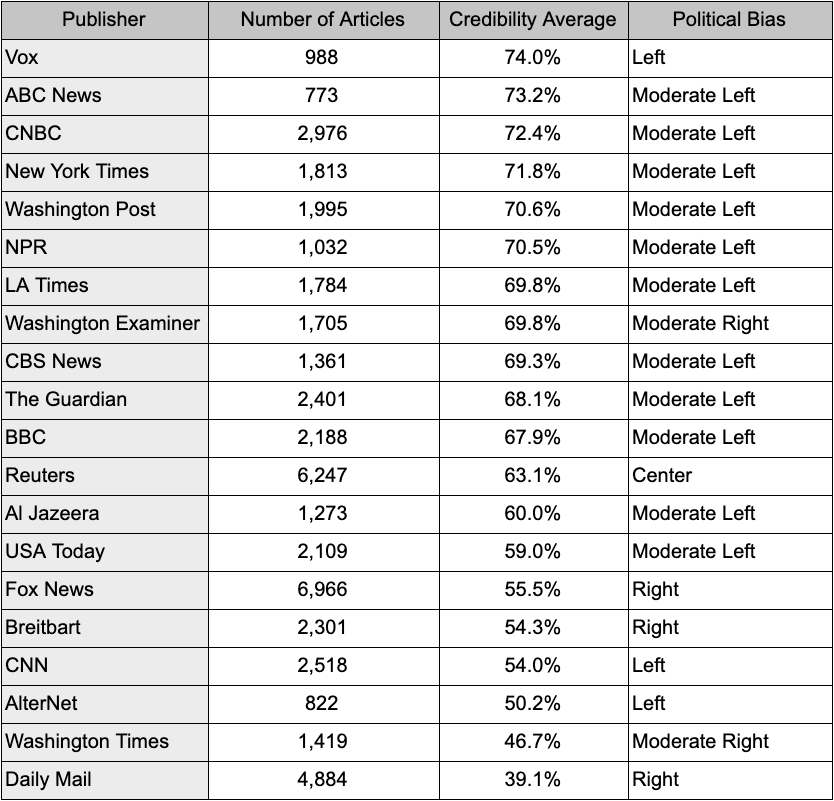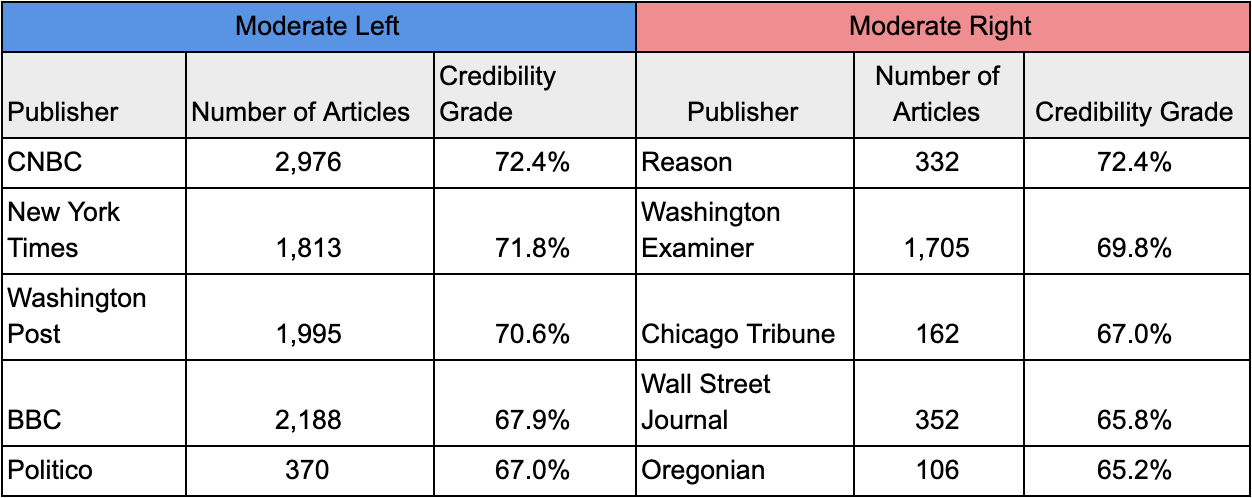Fox News and CNN are commonly framed as opposing forces in the battle for truth, representing opposed Republican and Democratic sides. However, our recent investigation of Covid-19 news articles since January 1 (71,260 articles from 206 news outlets) shows that the vast majority of articles from either source are poorly researched, highly opinionated, or otherwise less credible than many other outlets out there. Moreover, the two outlets present symptoms of a clear larger trend: more politically biased news is less credible on average.
Bias itself isn’t the problem — every author has some frame of reference owing to their background, and bias alone doesn’t make an article less credible. The Factual evaluates article credibility based on four factors: (1) the author’s topical expertise, (2) the publication’s historical reputation, (3) the extent of sources in the article, and (4) the tone of the writing (neutral vs. opinionated). This means that any author who makes a well-researched argument, with minimal opinions, and consistently writes on the topic stands to rate highly — regardless of the political bias of the outlet for which they write.
During the Covid-19 pandemic, opinionated or poorly researched stories have allowed for selective framing of data and contributed to a public discourse that is increasingly divided and partisan over the reality of the virus. More than ever the public needs scientific facts and expertise to stand above partisan rhetoric and opinion.
Please check your email for instructions to ensure that the newsletter arrives in your inbox tomorrow.
News Outlets on the Right Have a Credibility Problem

Looking at all 206 outlets and 71,260 articles surfaces our first finding: articles toward the center of the spectrum score higher, with the most credible reporting coming from the Center and Moderate Left. The credibility of Covid-19 news declines as one moves away from the political center, in either direction. The data also suggests that outlets in the Right category have considerably lower credibility on average than any other part of the political spectrum.
Right outlets (50.1%) score a full 10 points less than outlets from the next-highest ranked group (Moderate Right: 60.1%). By our metrics, that means articles from outlets classified as Right tend to be less well substantiated, incorporate fewer or less credible sources, and be more opinionated in tone by a pretty substantial margin.
The Most Popular Outlets Have Low Average Scores

*The list above includes the 20 outlets with the highest overall output of Covid-19 news.
** We do not have a complete dataset for the Wall Street Journal because of the site’s paywall. Based on our partial sample (315 articles), WSJ scored at 65.8%.
According to the Factual’s credibility metrics, articles scoring 75% or higher are highly likely to be credible. None of the outlets above achieved such a score in a majority of their Covid-19 reporting. That doesn’t mean all of these outlets shouldn’t be trusted for quality journalism, but it does suggest we need to be mindful of the veracity of what we read, regardless of where it comes from.
Left-leaning readers will be quick to identify arch nemeses such as Fox News (55.5%) and Breitbart (54.3%) as poorly performing, but one can also see that several Left sources on this list score even worse, including CNN (54.0%) and Alternet (50.2%). More importantly, more biased outlets score less well than their moderate counterparts. (Vox is an exception and can be explained by their explanatory approach to the news; they are proficient at covering the why of news, even if you disagree with their political perspective.) Otherwise, five of the six lowest-scoring outlets above have a strong political bias, suggesting that more biased outlets are less credible for Covid-19 news by our four metrics.
Why does Reuters score poorly?
Some people may notice that Reuters, a wire service used by many outlets and considered centrist in its reporting, doesn’t score very highly. In part, we attribute this to many Reuters articles not always having an assigned author.
While this may seem unfair, the purpose of our scoring system is to tell you how likely something is to be credible. When we cannot confirm that an author has a verifiable publication history, especially on a specific topic, it takes away one of our tools for quantifiably measuring credibility. It doesn’t mean that the article is false, it just means our algorithm can’t be sure of its quality. However, most news sites do have clearly noted authors, so this caveat applies mainly to articles from wire services such as Reuters and the Associated Press.
Please check your email for instructions to ensure that the newsletter arrives in your inbox tomorrow.
Averages Hide that Credible News Exists Across the Political Spectrum
Despite its low overall average score, outlets classified as Right still produce highly credible journalism. One need not look far for examples, such as “Coronavirus Is Officially A Pandemic, But What Does That Mean?” (The Federalist – 91%) or “Ramping Up: Layoffs continue, but some companies are hiring vigorously” (City Journal – 87%). The problem is that these articles are far fewer and farther in between than in any other part of the political spectrum.
A similar dynamic may be playing out when one considers Moderate Left (67.5%) and Moderate Right outlets (60.1%); highly credible journalism appears to be slightly less common from Moderate Right outlets. However, it is also true that topline averages obscure that many outlets in these categories actually score quite similarly when disaggregated. This offers further evidence that credible stories are present throughout the political spectrum, you just have to know where to look.

Where to Get Consistently Credible Covid-19 News
We’ve made this point before and we’ll make it again. The most credible Covid-19 news — meaning the most well-researched and neutral reporting from authors and publishers with demonstrable records of quality journalism — tends to come from the center of the political spectrum.
In April, we found that 7 of the top 10 most credible outlets on Covid-19 are from the Center and include smaller, science- and technology-focused newsrooms, such as Smithsonian Magazine, Undark, and ArsTechnica. That conclusion is given greater context by our data today, which shows credibility declining as political bias increases.
When it comes to strictly political questions, we understand the urge to go to outlets that share your perspective. But politics can’t be allowed to dictate our response to Covid-19. For that we must rely on science and the behavior of the virus itself — and many questions in that regard remain unanswered. The answers that we do eventually receive will not be beholden to political timetables or beliefs. That means we should think twice about whether news from heavily-biased sources are actually the best choices for our news consumption. That’s bad news for the likes of Fox News and CNN.

